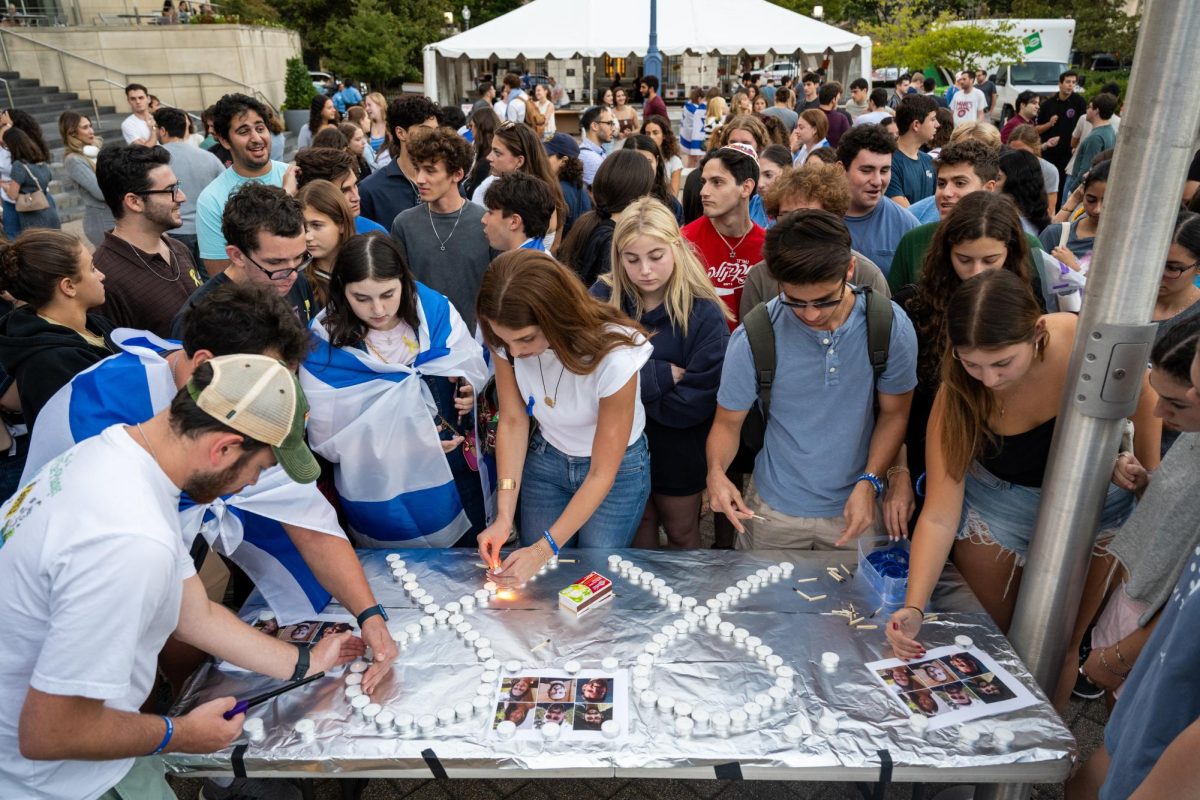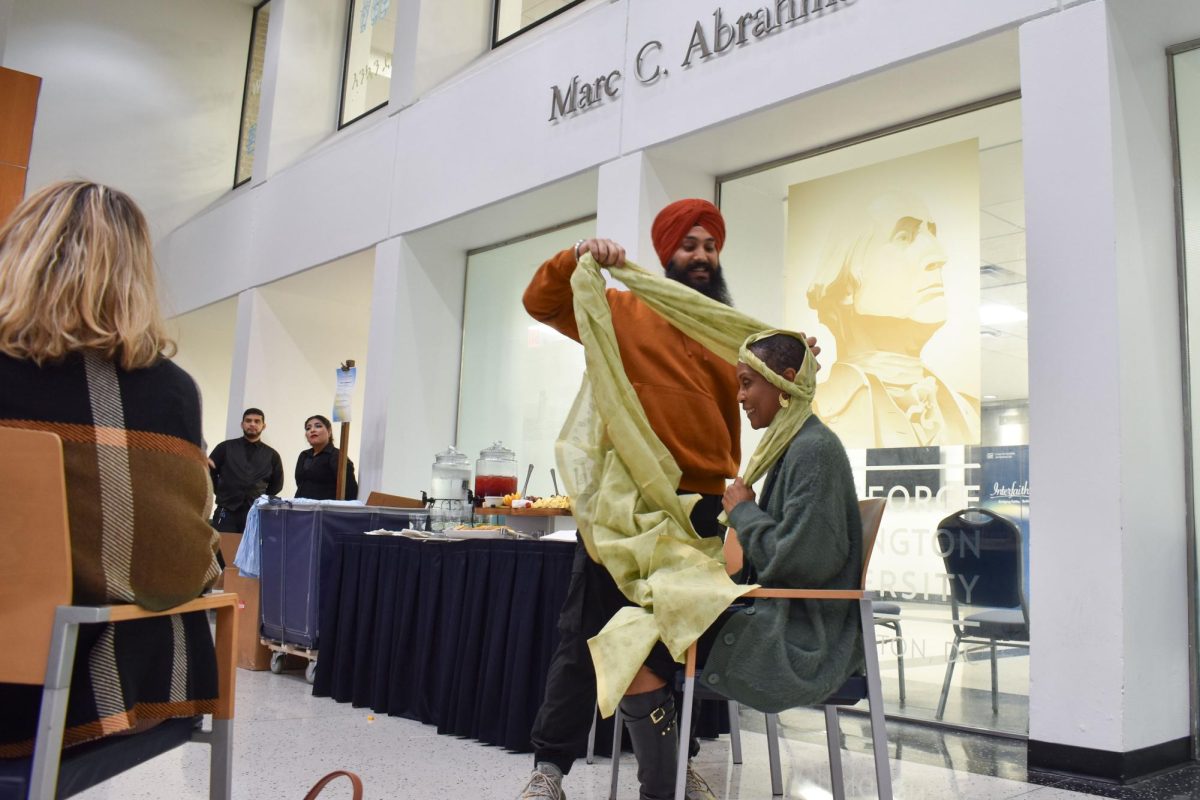Students and community members came together on campus earlier this week to mourn the lives of six Israeli hostages found dead in the Gaza Strip on Saturday nearly one year after they were kidnapped by Hamas on Oct. 7.
GW for Israel hosted a vigil Monday evening at the Veterans Memorial Park in Kogan Plaza and GW Hillel hosted a ceremony in the Hillel building on Tuesday to remember six hostages whose bodies were recovered by Israeli Defense Forces on Saturday. As the war in Gaza enters its 11th month, students and leaders recited the slain hostages’ names, shared eulogies and prayers and encouraged attendees experiencing grief to support one another.
IDF officials announced on Sunday that the military and Israel Security Authority recovered the bodies of six hostages held by Hamas in an underground tunnel in Gaza the day before. Israel’s health ministry reported that the hostages had been killed one to two days before their discovery. Out of the roughly 250 people abducted on Oct. 7, more than 60 living hostages are believed to remain in Gaza and another 35 are presumed dead.
Protests and labor strikes have escalated in Israel as citizens criticize Prime Minister Benjamin Netanyahu and his cabinet for failing to reach a hostage release deal with Hamas.
More than 150 people gathered in Kogan on Monday night at 7 p.m. to honor Hersh Goldberg-Polin, Alexander Lobanov, Carmel Gat, Almog Sarusi, Eden Yerushalmi and Ori Danino at the vigil hosted by members of GW for Israel. Gabi Guigui and Sean Shekhman, the group’s president and vice president, read the names and eulogies for each of the slain hostages.
“It’s September 2, but it feels like October 8,” Guigui said.
Attendees wore yellow ribbons in solidarity of the hostages and kippahs — a skullcap traditionally worn by Jewish men — and wrapped the Israeli flag around themselves as they leaned against one another. Guigui said times of sorrow remind Jewish Americans of the “immense” value they place on life and being in community during times of mourning.
“The collective grief we experience is a testament to how we are all one family,” Guigui said. “When one of us suffers, we all feel that suffering together, even though many of us may have never met Hersh, Eden, Ori, Carmel, Almog and Alexander, we mourn them as our own.”
Former GW for Israel President Jessica Carr said she met Goldberg-Polin, a 23 year-old Israeli-American from California, during a trip to Israel in the summer of 2017. Carr said she thought Goldberg-Polin was “doing very well” after seeing a few of his Instagram posts at a music festival a few days before Oct. 7.
She said since learning Goldberg-Polin was taken by Hamas, she constantly thought of him and reflected on the short time they spent together in 2017.
“What I remember most about Hersh is that despite the fact that the cool kids wanted to hang out with him, he made an effort to befriend every person he met,” Carr said. “Hersh was the person who found the lonely kid in the room without being asked to do so, and we know how uncommon that is for a 16-year-old.”
Shekhman said it was “incredibly painful” to learn that Goldberg-Polin had been killed, especially since his mother has been an outspoken advocate for the return of the hostages, recently speaking at the Democratic National Convention with her husband last month where they called for their release and an end of the suffering inflicted on innocent civilians in Gaza by the IDF.
“Why do I keep on having to plan vigils?” Shekhman said. “I pray for the day when I don’t have to do this anymore, but the ability to come together — everybody as one family, not just Jewish, not just Israeli, but everyone has been incredibly powerful.”
Thousands gathered in Jerusalem on Monday for Goldberg-Polin’s funeral.
Rabbi Yudi Steiner, the director of the Rohr Chabad Center at GW, said the world is experiencing the thesis of “People Love Dead Jews” — a nonfiction book written by Dara Horn that describes people’s interest in the tragedies experienced by the Jewish community instead of respecting those living. Steiner said people may feel helpless and hopeless but that the six hostages would have wanted their community to honor their lives by embracing their Jewish heritage.
“This is just the beginning of your individual story as a proud Jew,” Steiner said. “May you all, we all live long, happy, productive, proudly Jewish lives, and may their memories not just be a blessing and a memory, but may it be a rallying cry for us to be much more proudly Jewish, much more engaged in our Judaism, much more knowledgeable Jews. I’m fairly confident that that’s exactly what they would tell us they want us to do.”
Nate Neustradt, a first-year studying international affairs, said he hopes for an end to the war that will stop the suffering of innocent people and the return of Israeli hostages.
“At the end of the day, what I truly believe is that there is no winner to a war,” Neustradt said. “Innocent people dying on either side is terrible. It’s sad, and what I want at the end of the day is for our hostages to be returned and for innocent [people] to stop dying on both sides, so that we can reach a peaceful and permanent resolution.”
Steiner read a verse from Psalm 121 in the Hebrew Bible and translated it into English. Three students sang the Israeli national anthem “Hatikvah.” Attendees then lit candles in honor of the hostages as most people stayed with one another, hugging and grieving while the sun continued to set. Three Metropolitan Police Department cars and a police officer on a motorcycle patrolled the area from a distance.
About 15 students and Hillel staff members gathered in the Lerner Family Hall in the Hillel building on Tuesday morning to remove the posters of the six slain people from the wall of posters of missing kidnapped Israeli hostages taped to a front glass window of the building.
Hillel Executive Director Adena Kirstein invited students to read each of the hostages’ eulogies and gently take down their posters before the memorial concluded with a prayer for the remaining hostages. She said she was grateful they removed the posters “with love” because people often associate the removal of posters with anger.
“We do it very carefully as our brothers and sisters stare upon us,” Kirstein said. “We cherish them today knowing how much they were cherished by their mothers and fathers and their loved ones who put them to rest in the last 48 hours, and while I wish we were not here, and I wish that they were not in our windows, they are now a part of our collective story.”
Kirstein said the center was grateful to use its big windows to display the posters because they felt they “needed to do something with them.” She said she can not bring herself to reprint the posters again due to their age after reprinting them once since first posting them after Oct. 7.
“They’re old. They’re falling down,” Kirstein said. “They’ve fallen down a number of times. I can’t count how many times we have reposted them, and I want to believe that when people see how old they are, they remember how long this has been going on, and it’s just not great, so they’re going to stay old, but we’re going to rehang them again until we need to not rehang them anymore.”





